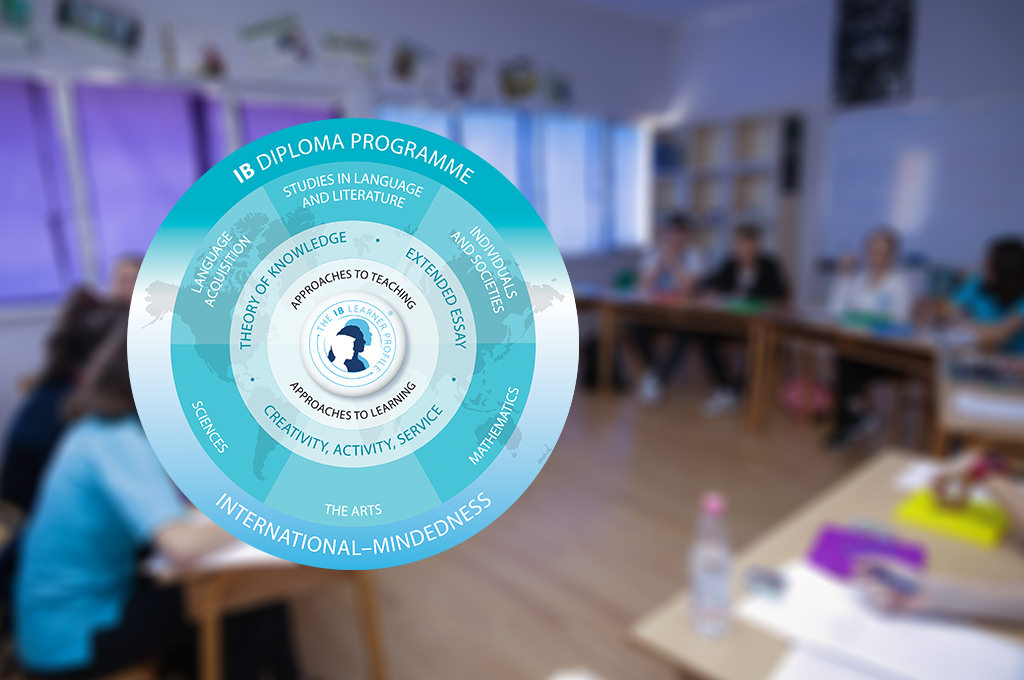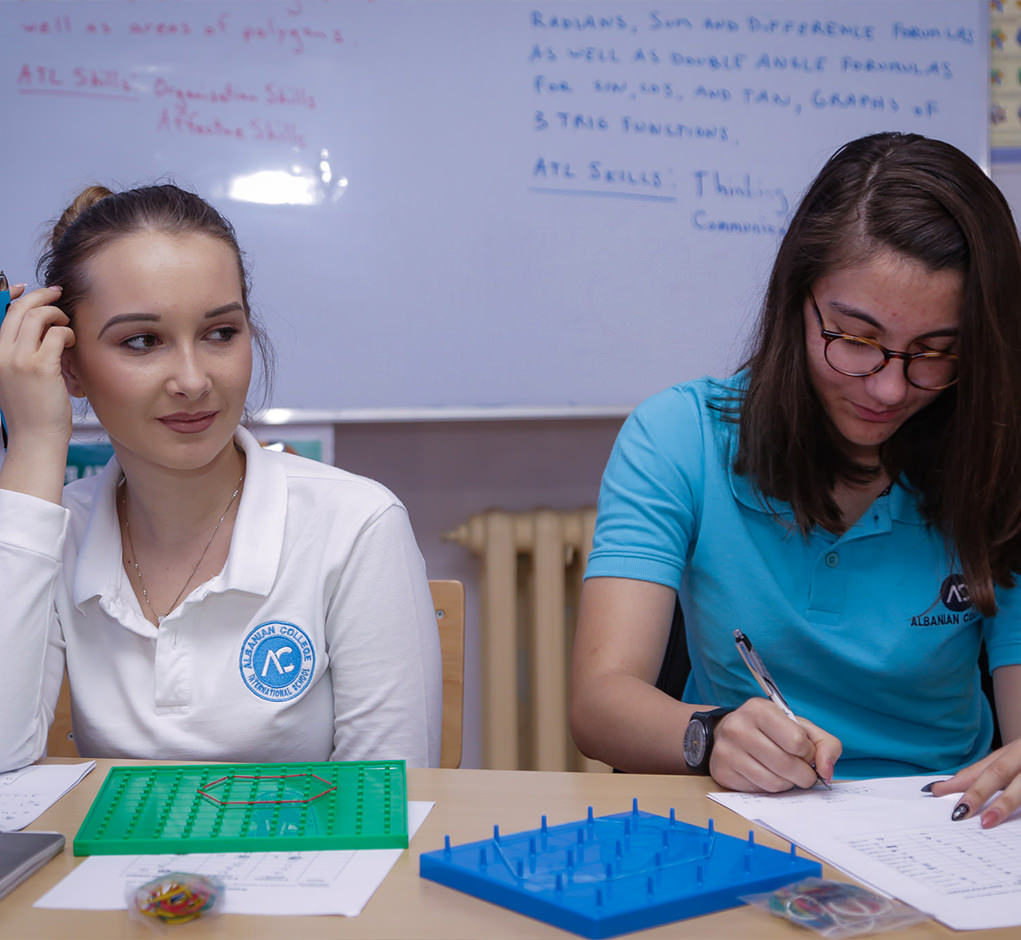IB Diploma Programme

IB Diploma Programme
Albanian College is a fully-authorised International Baccalaureate World School offering the internationally prestigious Diploma Programme to students who meet the admissions requirements. These requirements include English skills at a Common European Framework (CEFR) B2 level or above and demonstrated success in prior grade levels. All students who pursue the IB Diploma are considered “candidates” until all courses of study are completed at the end of Grade 12.
Candidates will select one subject from each of the first five groups:
- Group 1: Students in Language and Literature
- Group 2: Language Acquisition
- Group 3: Individuals and Societies
- Group 4: Science
- Group 5: Mathematics
- Group 6: The Arts, an optional group
Subjects are taught at Standard Level (SL) and Higher Level (HL). From the six subjects chosen, candidates must chose three standard level subjects arne three higher level subjects. In order to receive the IB Diploma, candidates must also complete the requirements within the Core which include Theory of Knowledge, CAS, and the Extended Essay.

Subject Areas
-
Studies in Language and Literature
Albanian College offers the Diploma Programme courses English Language and Literature and Albanian Literature. These courses use a broad range of texts, and students grow to appreciate a language’s complexity, wealth and subtleties in a variety of contexts. Students take their studies in a language in which they are academically competent.
READ MORE -
Language Acquistion
Albanian College will be offering a French B and English B courses in Language Acquisition. The main emphasis of these courses is on the acquisition and use of language in a range of contexts and for different purposes while, at the same time, promoting an understanding of another culture through the study of its language.
Here are the links to Subject Brief:
French B Ab Initio SL
English B Standard Level
English B Higher Level -
Individuals and Societies
Albanian College offers Diploma Programme courses in History and Geography. Studying any one of these subjects provides for the development of a critical appreciation of:
READ MORE
-
Mathematics
Albanian College offers three courses in Mathematics, MathematicsStudies, MathematicsStandard Level, and MathematicsHigher Level. The aims of these courses are to enable students to:
• Develop mathematical knowledge, concepts and principles
• Develop logical, critical and creative thinking
• Employ and refine their powers of abstraction and generalization.
READ MORE -
Science
Albanian College offers Diploma Programme courses in Biology, Chemistry, Physics, and Computer Science. These courses are taught practically. Students have opportunities to design investigations, collect data, develop manipulative skills, analyse results, collaborate with peers and evaluate and communicate their findings. While the scientific method may take on a wide variety of forms, the emphasis on a practical approach. The investigations may be laboratory based or they may make use of simulations and data bases. Students develop the skills to work independently on their own design, but also collegiately, including collaboration with schools in different regions, to mirror the way in which scientific research is conducted in the wider community.
READ MORE -
The Arts
Albanian College offers the Diploma Programme Visual Arts course. This course is designed to foster critical, reflective, and informed practice. It will help students understand the dynamic and changing nature of the arts and explore the diversity of arts across time, place and cultures. Students will be able to express themselves with confidence and competence. The course encourages students to challenge their own creative and cultural expectations and boundaries. It is a thought-provoking course in which students develop analytical skills in problem-solving and divergent thinking, while working towards technical proficiency and confidence as art-makers. In addition to exploring and comparing visual arts from different perspectives and in different contexts, students are expected to engage in, experiment with and critically reflect upon a wide range of contemporary practices and media. The course is designed for students who want to go on to study visual arts in higher education as well as for those who are seeking lifelong enrichment through visual arts.
Subject Brief
Visual Arts Standard Level
Visual Arts Higher Level
Related Policies
-
Special Education Needs
Albanian College values diversity as a key aspect of being internationally-minded and as an important goal for all future IB programmes. Student diversity includes gifted as well as special needs students. Albanian College aims to:
•Identify special education needs as early as possible
•Ensure that all teachers understand and apply the principles of inclusion
•Consult with parents, students and others as necessary to best understand and meet individual student special educational needs
•Provide guidance and training for teachers as needed
•Accommodate special educational needs appropriately within the means available to the school
•Follow the school Admissions Policy regarding special educational needs
For more information, here is the Special Educational Needs Policy. -
Admissions Policy
The focus of Albanian College admissions is a student’s ability to be academically successful. Albanian College does not discriminate on the basis of gender, race, nationality, religion, sexual orientation, mother tongue, or social or cultural background. Admissions to Grades 11 and 12 take into consideration the rigour of the International Baccalaureate Diploma Programme (IBDP). Albanian College encourages all students to pursue the full IB Diploma.
The school will take every opportunity to support students in this endeavor including:
•Offering a broad range of IBDP subjects.
•Providing qualified teaching staff.
•Ensuring that there is a broad range of resources available to students such as access to online databases through the school’s library.
•Making available the services of a University and Careers Counselor.
For more information, here is the Admissions Policy. -
Academic Honesty Policy
Academic honesty is a set of values and skills that promote personal integrity and good practice in teaching, learning, and assessment. It is influenced and shaped by a variety of factors including peer pressure, culture, parental expectations, role modeling, and taught skills. Albanian College strives to create global citizens who are aware of the importance of producing authentic work. We believes in academic honesty and aim to create a community of learners who:
•Are principled, as required by the IB Learner Profile
•Acknowledge the importance of authentic work
•Are aware of the definitions and consequences of academic malpractice/misconduct
•Hold all members of the school community responsible for ensuring that academic honesty is celebrated and required.
For more information, here is the Academic Honesty Policy. -
Assessment Policy
Albanian College has aligned its Assessment Policy with the requirements and philosophy as established by the programme standards and practices of the International Baccalaureate Programme Standards and Practices. The Assessment Policy at Albanian College recognises that:
• Teaching and learning and the assessment of that learning are interdependent on a fundamental level.
• Students perform differently depending on the context of the learning, their skills, interests, and prior knowledge and can benefit from learning accommodations, when necessary (See Special Educational Needs and Inclusion Policy).
• Students and parents have different cultural experiences and expectations regarding assessment.
• Students must recognise their achievements and identify areas where further development is needed, meaning that it is crucial that they receive timely feedback that is both positive and constructive.
• Assessment should be ongoing, student-centred, criterion-related in Middle Years and Grades 11 and 12, as well as engaging.
• Assessment, recording, and reporting are a crucial and integral part of the teaching and learning process.
• Effective assessment, recording, and reporting promotes a partnership between students, teachers, parents, leadership, other schools, and universities.
• Assessment that results in improved student learning and provides opportunities for a range of learning requires a range of appropriate approaches.
Assessment is done:
• To facilitate student learning and reflection on that learning.
• To assist in communicating with students and their parents about progress or areas of improvement.
• To enable teachers to develop better pedagogy by reflecting on the outcomes of assessments and to adjust instruction according to individual students’ needs for the next activity and/or unit of learning.
For more information, here is the Assessment Policy. -
Language Policy
The Language policy is based on the following beliefs:
• We acknowledge that language is a vehicle for trans-disciplinary learning and for learning how language works.
• We also understand that every teacher is a language teacher.
• Our students come with different language backgrounds and vary in their ability to learn languages.
• All languages are equally valued and may be used as a medium of inquiry.
• We view the on-going language development for AC students as the shared responsibility of all teachers, parents and students.
• We teach language through context and relate new information to existing knowledge.
• We view the range of languages within our school as an opportunity, which allows us to reflect on and celebrate the multilingual society we live in.
For more information, here is the Language Policy.
